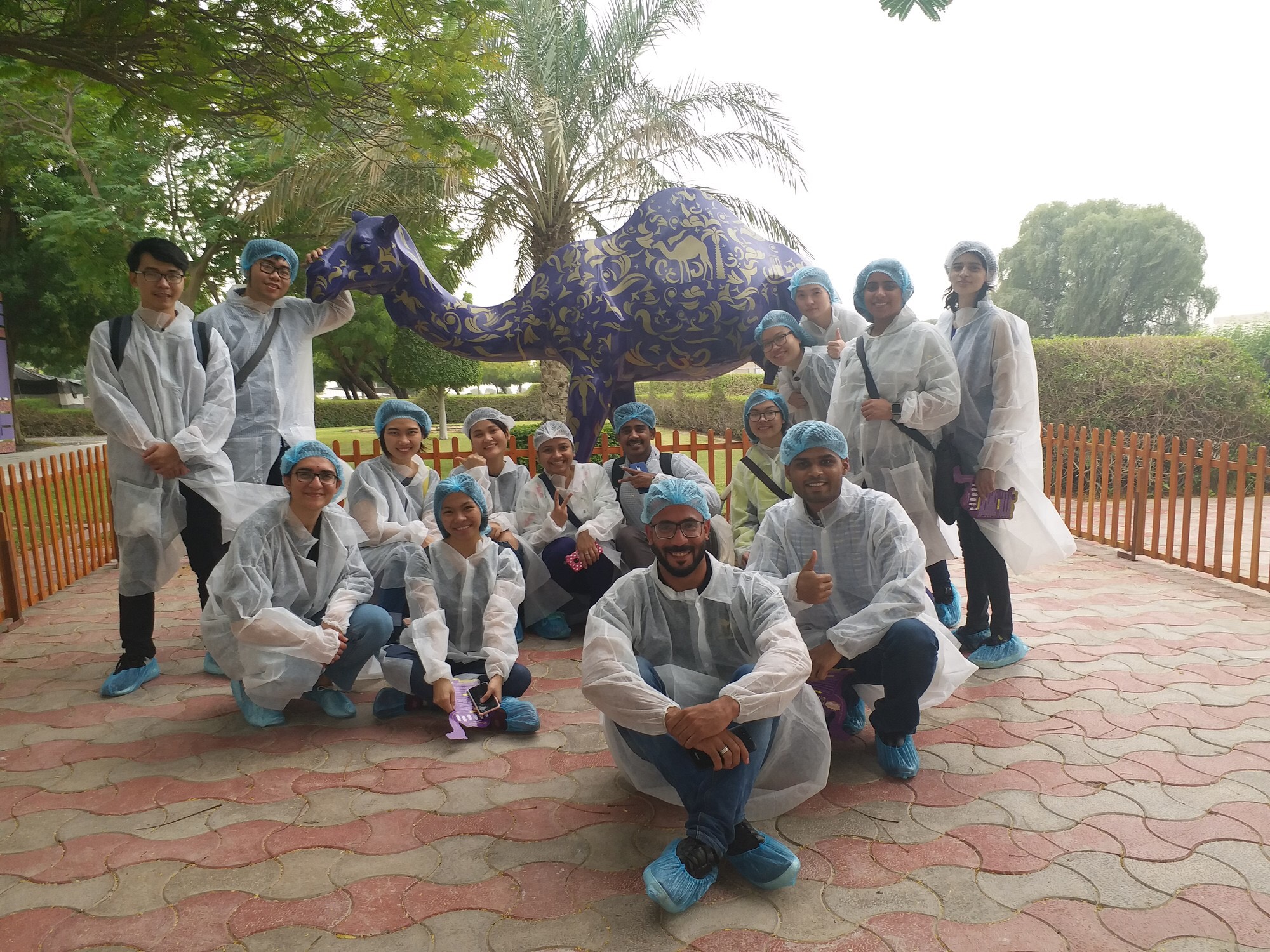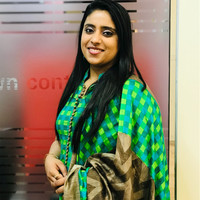Visit to Camelicious Farm in Dubai – Understanding the Cultural and Economic Value of Camels

Mehak Sethi, our MGB Sep’18 intake student, shares her experience of the visit to the Camelicious Farm:
Camels are a key part of UAE’s rich heritage. Historically, camels in the UAE were a dependable source of not only transport but also food and milk. SP Jain School of Global Management’s Master of Global Business (MGB) September 2018 cohort visited the Camelicious Farm on 17th November 2018 to understand the cultural and economic importance of the ship of the desert – the camel.
As we entered the farm, we were welcomed by the Camelicious tour guide, Mr. Mohammed Samir – Operations Manager. He shared insights on how the camel industry has developed over time. He also explained and showed the processing and production unit of camel milk. The officials made sure that each of us wore a sanitary cloth to cover our hair, an overcoat and shoe covers to ensure the sanitation of the place was not exposed to any harmful element.
Mr. Samir explained how powdered milk is produced and how expensive it is. He also told us about the benefits of using camel milk products which are rich in vitamins and suitable for lactose intolerant people. Camel milk can also be used for making yoghurt, kurth, butter, ghee, rabbri and khoa. Meat, hides and hair are useful by-products of camels. He then took us to the camel farm where there were more than 5,000 camels. It was interesting to learn that a male camel that is six years old can also be called ‘Baeer’ while a female camel of the same age can also be known as ‘Nagah’.
The best-known breeds of Arabian camels found in the UAE are the ‘Misk’, ‘Dhabian’ and ‘Shtoota’. Before ending the tour, Mr. Samir got us some carrots to feed the camels.
In the end, we visited the café outside the Camelicious Farm where they gave us a sample of camel milk which was very good in taste. Camels still have an important role in the UAE society with many Bedouin families still owning a few animals that provide milk and are sacrificed during festivals.
Angad Shah, our MGB Sep’18 intake student, shares his key learnings from the visit to the Camelicious Farm:
I was very enthusiastic and eager for this visit as it was my first ever visit to Camel Milk Dairy and I was curious to know more about camel’s milk, its nutrient content, its market share and many such questions. There we met Mr. Mohammed Samir, Camelicious tour guide, who introduced us to the Camelicious Farm.
We started our tour with processing and production unit of camel milk. After entering the processing unit, Mr. Samir gave us sanitary cloth coverings to wear, thereby showing how important sanitation is for them. He spoke about the processes involved in the centre like pasteurising, making of milk powder, making of shampoo from the milk and many other things. I took the opportunity to interact with Mr. Samir and asked him about the management process, financial information, etc. He was happy to help us by sharing insights on the same.
He then took us to the farm where there were more than 5,000 camels. I was very excited to see them. He told us about the daily routine of the camels, their requirement of food and water and their life-cycle, among other things. We saw the milking process. There were milk machines installed at one place. The camels were very disciplined. They did not require any managing. They came in groups to that place and entered one by one in line. The farm officials put on the machines and when it was done, the camels went back to their places on their own. This process was worth watching.
Later, Mr. Samir gave us some carrots to feed the camels. After the visit to the camel farm, he took us to Majlis Café of Camelicious where he gave us samples of camel milk to taste – it tasted somewhat salty and sour in comparison to cow’s milk.
During the visit, we learnt about several health and nutritional benefits of camel’s milk:
Nutritional Benefits
- Camel’s milk is naturally less in fat with approximately 50% lesser fat content than cow’s milk
- It contains unsaturated fatty acids, which are healthy fats, present in higher percentage than in cow’s milk and helps to reduce cholesterol to aid healthy cardio-vascular functioning
- It is rich in natural vitamin C, which is present in much higher percentage than in cow’s milk
- Recent studies have suggested that camel milk has a positive effect on patients with type 1 diabetes
- Some views suggest that people with lactose intolerance might digest camel milk easier than cow’s milk
- Camel milk is a natural pro-biotic to assist healthy bacteria growth within the gut and you can also drink as much as you like without feeling bloated due to its excellent digestibility and it does not curdle in the stomach
- It is clean and natural tasting and not as distinctive as goat or cow’s milk
Beauty Benefits
- Camel milk contains lanolin and other natural moisturising nutrients which provide a calming and soothing effect on skin
- Researchers have noted that camel milk has beneficial properties on treating psoriasis patients by both ingestion and topical application
- It has anti-aging properties – elastin, vitamin C and lanolin acid can be used topically in creams, soaps and baths
- It is good for healthy bones, nails, hair, teeth and skin due to the presence of calcium, vitamins and minerals.
The visit to Camelicious was wonderful, informative and, at the same time, fun. Thank you SP Jain and Ms. Megna Kalvani, Senior Manager – Global Learning & Student Life.

About the Authors: Mehak Sethi and Angad Shah (MGB Intake of Sep’18)
Mehak Sethi: Born and brought up in Delhi, India, Mehak is currently pursuing the Master of Global Business course from SP Jain School of Global Management in the field of contemporary marketing management. She understands people and their feelings and, therefore, knows how to connect with them and manage them. She is skilled in project management and believes she is a good leader who aims to achieve the best results possible. Her hobbies are music, travelling and reading.
Angad Shah: Angad Mukund Shah is a Master of Global Business student from the September 2018 cohort specialising in Global Finance at SP Jain School of Global Management. He is an adaptable, creative and analytical thinker who is keen to achieve his goals and serve the society.




